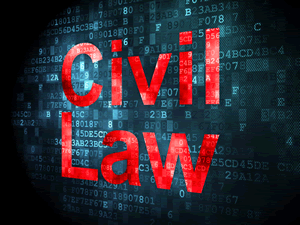What is the newspaper legally allowed to print about a person?
Recently on our legal forum a user asked, “Our city newspaper wrote something about me that I considered private. I understand that the we have freedom of the press in this country, but I am wondering where my right to privacy begins and their right to freedom of the press ends.”
Why is freedom of expression important?
Our forefathers understood that freedom of speech and of the press were critical to the exchange of ideas and the growth of a vibrant republic, or more aptly put by Justice Louis Brandeis, the "freedom to think as you will and to speak as you think are means indispensable to the discovery and spread of political truth."
Ultimately, however, freedom of expression, which includes written and spoken communication, is critical to restrain the corruption, ineptitude, and tyranny of the American government.
What is freedom of the press?
Freedom of the press was established in the First Amendment of the U.S. Constitution. The notion of freedom of the press allows publications to print materials (i.e. books, newspapers, magazines, pamphlets, films and radio and television programs) without censorship from the government.
Freedom of the press also prohibits the government from forcing newspapers to publish information, imposing taxes on the press that it does not levy on other businesses, forcing journalists to reveal the identity of their sources (some exceptions may exist), and barring journalist from certain public judicial proceedings.
Now, as you have recognized, freedom of the press can, at times, collide with other rights, such as an individual’s right to privacy. With the proliferation of the internet and other types of media this issue has become even more serious. For example, it’s not unusual for many media outlets to publish information about a person’s sexual proclivities with pictures included!
What is my right to privacy?
So what rights do you have when it comes to the freedom of the press and your ability to protect your privacy? First, the press is not supposed to print anything that is considered libel or false information. If they do publish false information and it causes you loss or injury, you may have the legal right to file a civil claim and sue them for libel. For this reason, most journalists work to ensure that what they publish is truthful.
Newspapers also have to guard against publishing personal information about a private citizen that “is not of legitimate concern to the public.” Obviously, this standard is a bit subjective. Courts evaluate cases on a case by case basis by determining the social value of the information and whether the person is a private or public citizen.
Can a newspaper write about my criminal charges?
You did not mention what type of information the paper decided to publish, but if you have been charged with a crime the newspaper has the legal right to report that information to the public.
While this might seem like an intrusion of your privacy, our current laws dictate that such information can directly affect the public and is therefore of public interest. Laws and codes of conduct followed by journalist, including the most common standard followed by journalist called the Society of Professional Journalists ethics code, provides standards and means to minimize harm. And as mentioned above, the information disseminated must also be true.
If the newspaper has published information which is not true and it causes injury or loss to you, talk to a personal injury lawyer to determine your rights.
Bottom line:
Our forefathers believed that a free press was critical for the development of a secure republic. While individuals do have rights to have some private information protected (i.e. medical health records) there is some private information that can be shared if it is considered of public interest.
Related Pages
Latest Question
Will my daughter inherit my debts when I pass?
Prior to the distribution of your assets and income, the courts will pay your debts.
Category: bankruptcy


